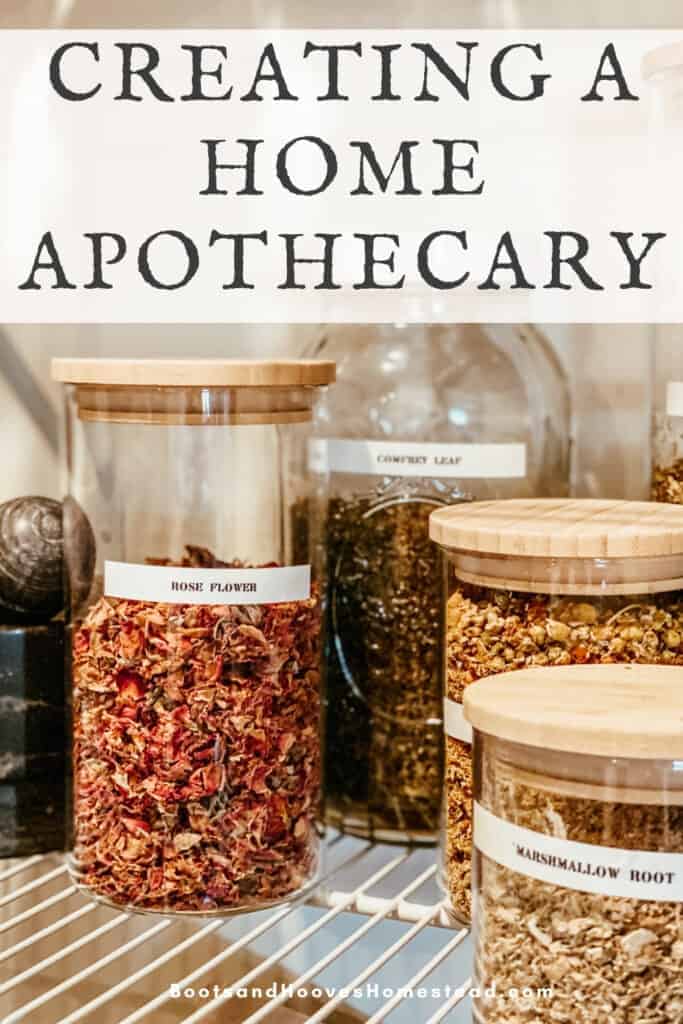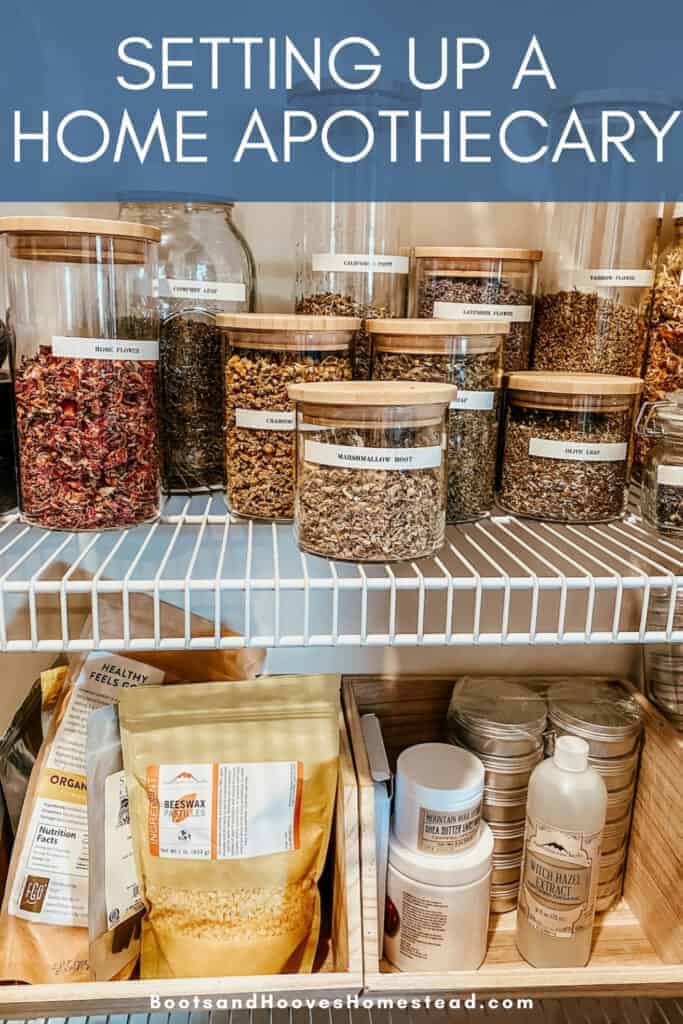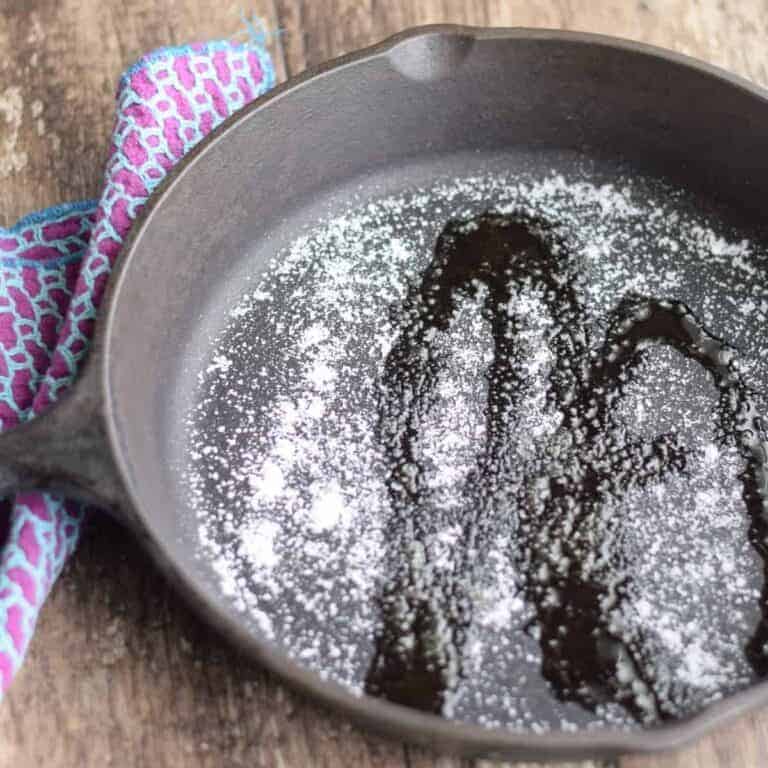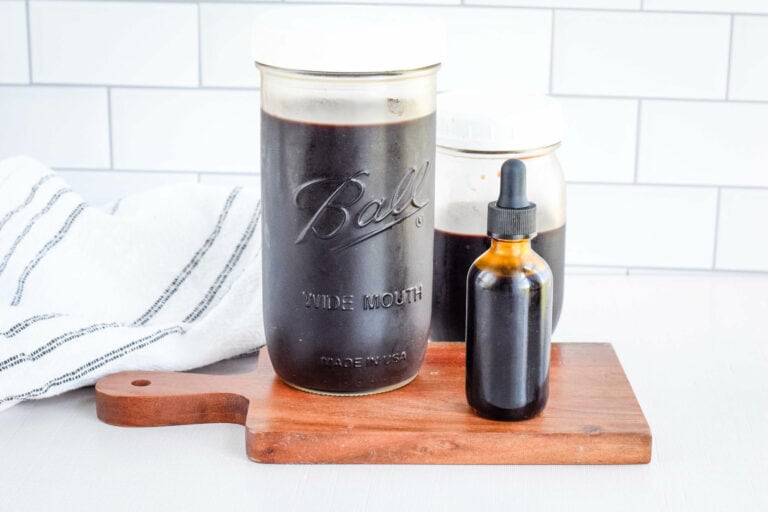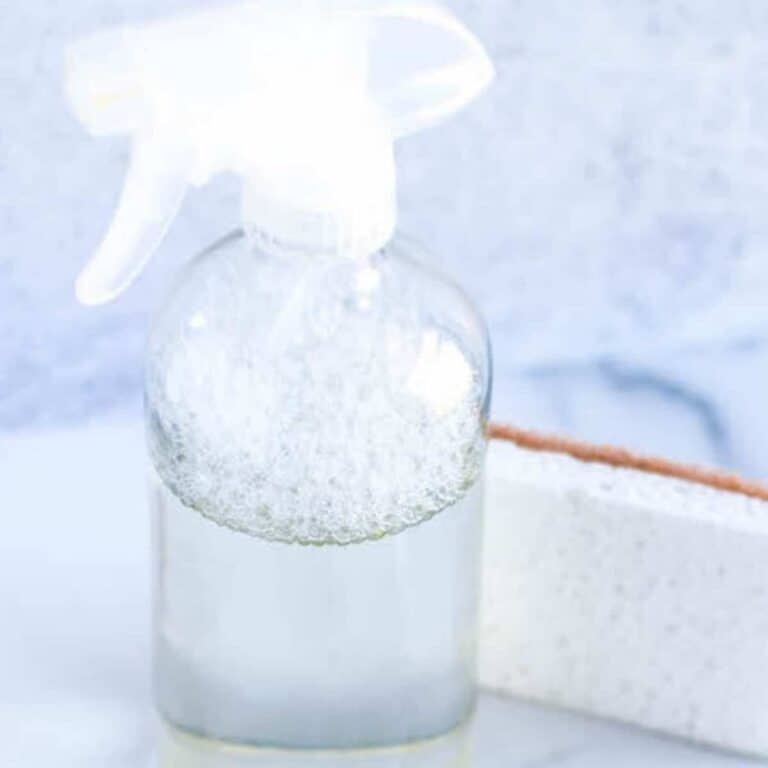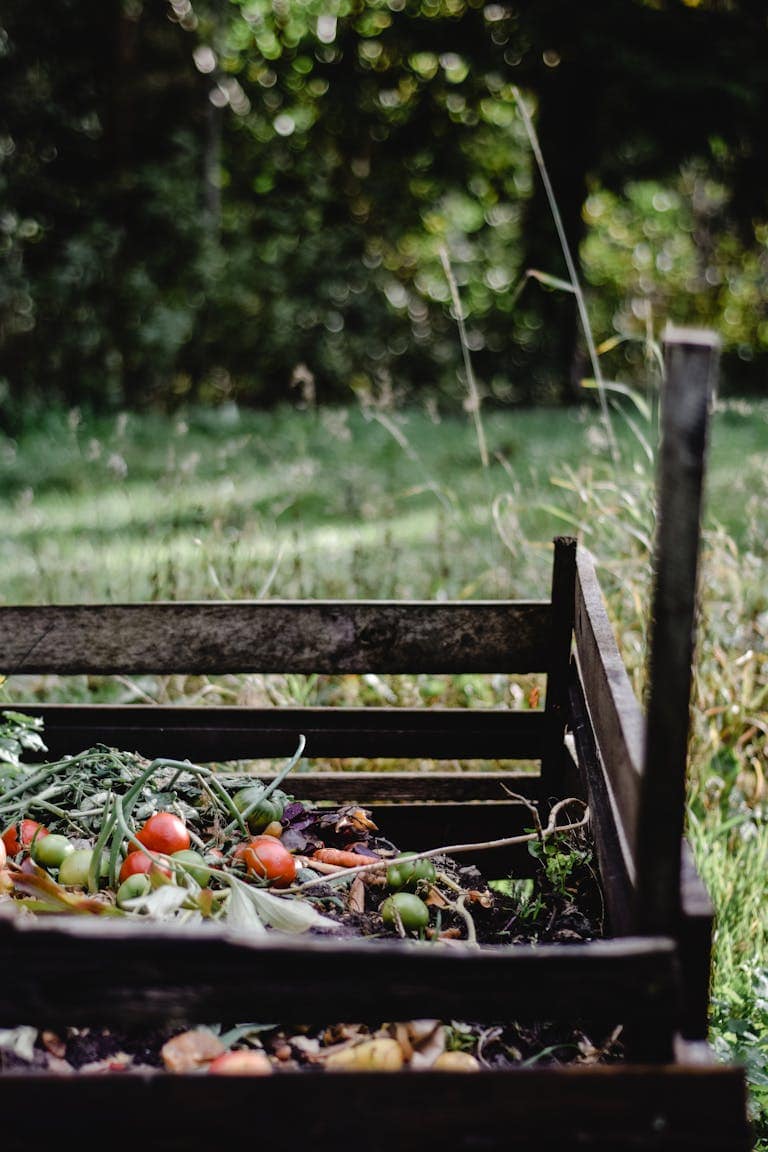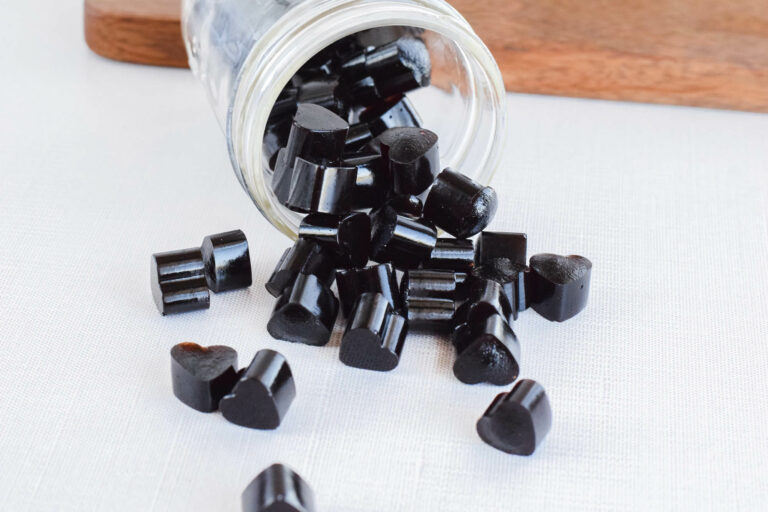Creating a Home Apothecary + Herbal Guide
Discover the benefits of creating a home apothecary, where you can store natural remedies and herbs for common ailments. Learn how to stock your apothecary and incorporate it into your wellness routine.
In this post, we’re sharing benefits of creating a home apothecary, where you can store natural remedies and herbs for various ailments and support your overall health and wellness.
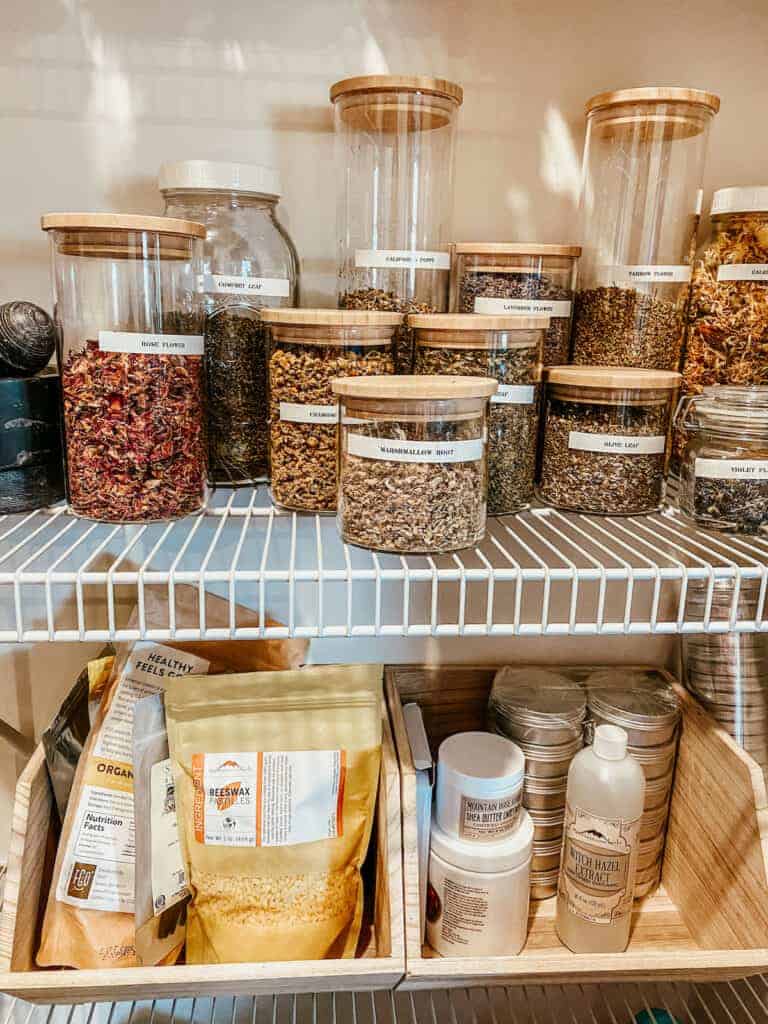
This post has been updated from its original publish date of April 6, 2021. It has been updated to provide better photos and more additional helpful information. Disclaimer: I am not a medical professional, this post is for informational purposes only. Please seek medical advice from your health care provider.
Building a home apothecary is a fantastic way to stay connected to natural wellness and take charge of your health. In this post, we are sharing some of the best tips for building and maintaining a useful, organized, and effective home apothecary.
What is a Home Apothecary?
A home apothecary is a personal collection of natural remedies, herbs, and medicinal preparations used to support health and wellness. It’s essentially a DIY pharmacy filled with ingredients and tools for making herbal medicines and other natural products.
The term “apothecary” historically refers to a person who prepared and sold medicines, but in the modern sense, a home apothecary is a space where you can store and craft remedies like herbal teas, tinctures, salves, essential oils, and more.
Key Features of a Home Apothecary:
- Herbs and Medicinal Plants: Dried or fresh herbs that can be used for various purposes like soothing a sore throat, calming anxiety, or aiding digestion.
- Remedies and Preparations:
- Tinctures (liquid extracts of herbs soaked in alcohol or vinegar)
- Herbal teas or infusions
- Salves and balms for topical healing
- Essential oils for aromatherapy or topical use
- Storage Space: Jars, bottles, and containers used to store dried herbs, oils, and preparations, often organized in a cabinet, shelf, or drawer.
- Tools and Equipment: Common tools include a mortar and pestle, dropper bottles, strainers, muslin cloths, and glass jars for storing remedies.
- Focus on Natural Health: A home apothecary centers on using natural, organic ingredients to manage minor health issues, promote relaxation, and maintain overall wellness.
Essentially, a home apothecary allows you to create and keep on hand natural alternatives to commercial pharmaceuticals, especially for common ailments like colds, headaches, skin irritations, and digestive issues.
Start Small and Focus on Basics
Begin by focusing on a few versatile herbs and remedies for common ailments and as a natural supplement as part of a healthy lifestyle. We would also recommend by taking a beginner’s course in herbalism if you’re completely new to this.
And one of our top favorite options is from a trusted and reputable business – The Herbal Academy.
There are also many great books on herbalism which will help to guide you on your journey. See our top recommendations below.
Recommended Products
Shop our favorite & top recommended herbal tools & books on our Amazon shop.
When you’re beginning, you may also want to start by focusing on a few versatile herbs and remedies for natural aids in a healthy lifestyle. This could include:
- Ginger (possible digestive aid, nausea relief)
- Chamomile (calming, sleep aid)
- Peppermint (headache relief)
- Lavender (calming, skin soothing)
- Elderberry (immune support)
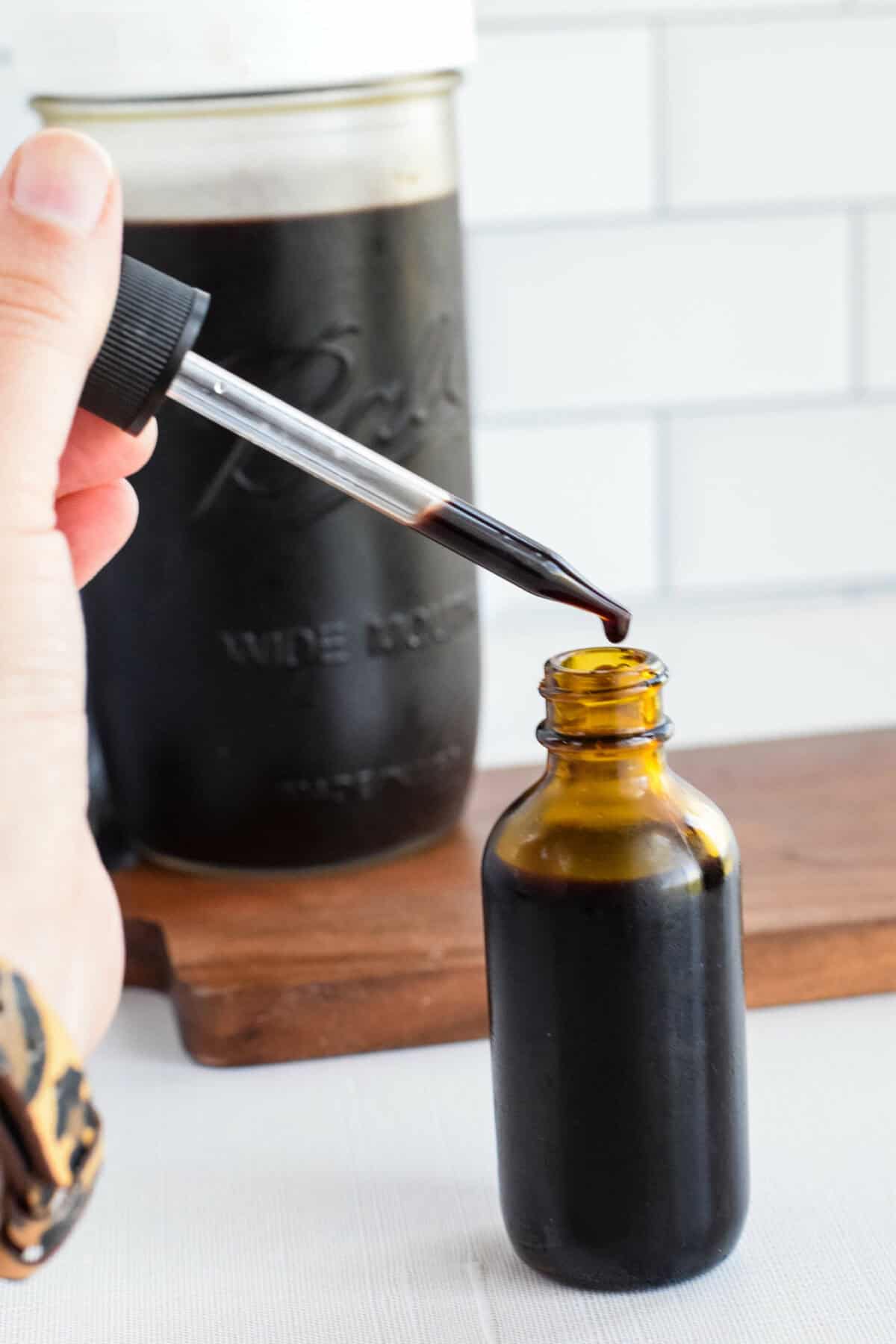
Home Apothecary Tips for Beginners
Learn the medicinal properties of each herb you collect. Use books, reputable online sources, or herbal courses to educate yourself on how each herb works in the body. You’ll also want to learn how these interact with medications and various dosing methods.
Create a small reference guide or notebook to record what you learn about different herbs, their uses, and preparation methods.
Build your apothecary around your family’s common needs and ailments. For example, if someone frequently deals with seasonal allergies, stock up on nettles and elderflower. For stress and anxiety, lemon balm and ashwagandha may be helpful.
But again, learning more about the herbs and their properties – as well as any potential reactions is necessary.
And as you build out your knowledge, you can start to include more remedies, creating your own elixir, tincture, oxymels, tonics, and personal care items like lotions, creams, salves, and balms.
Safety + Education
Always research the proper dosage and preparation method for each herb. Not all herbs are safe for everyone (e.g., pregnant or nursing women, children, people on medication).
Consider taking an herbalist course if you’re serious about deepening your knowledge and making more complex remedies and herbal medicines.
My favorite option for obtaining an herbalist course is The Herbal Academy.
Favorite herbal book recommendations:
- Field Guide to Edible Wild Plants
- Medicinal Herbs: A Beginner’s Guide
- Herbal Recipes for Vibrant Health
- Herbs for Children’s Health
- Encyclopedia of Herbal Medicine
Where to Set Up Your Home Apothecary
It is best to keep herbs in a place where they are stored away from direct heat or light. This will help protect the quality and potency and give them the longest possible shelf life.
Keeping airtight lids on dried herbs and ingredients can also help extend the shelf life. And since herbs lose their potency and expire over time, it’s best to keep a note with the date the herbs were harvested or put into storage.
Some recommendations on storage ideas depending on the availability in your home would be:
- pantry shelves
- in a cool basement
- cupboards
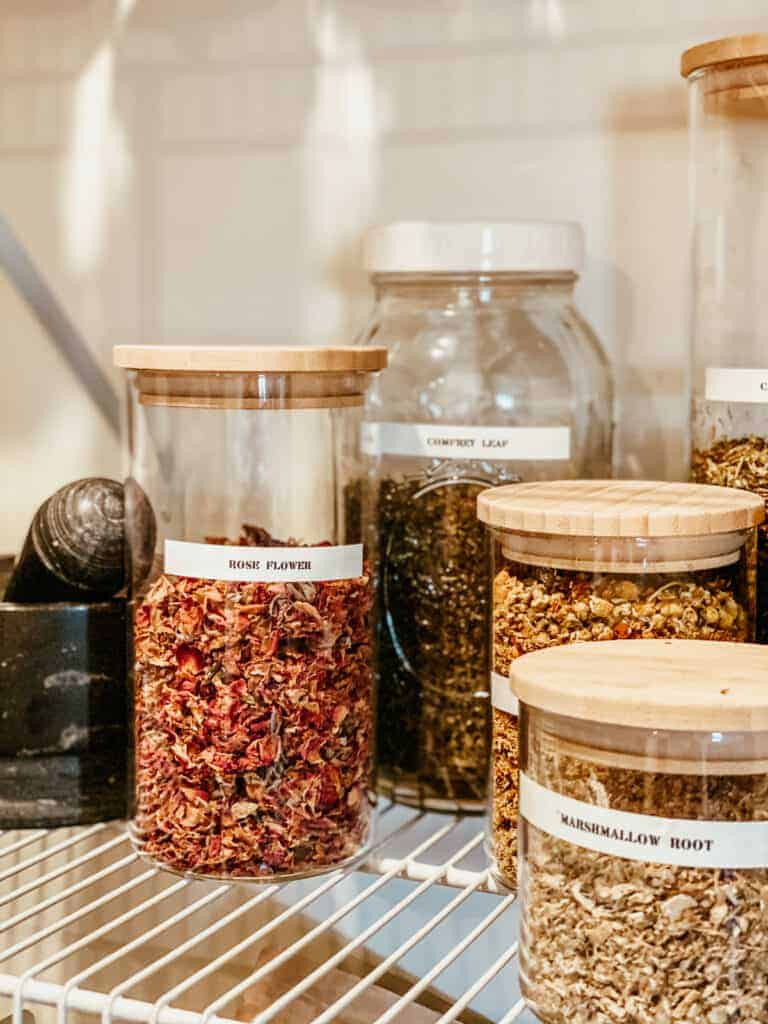
No matter where you choose, keeping it easily accessible and convenient for your needs will ensure you’re using it whenever needed.
It is important to try to keep in mind that it should be kept away from the heat and direct sunlight to help extend the shelf life of the herbs and concoctions that you create.
Want to save this?
When organizing your herbs and other ingredients, I highly recommend that you label & date everything. Using only fresh herbs & ingredients will give you a better end result.
Use dark glass jars or airtight containers to store herbs and oils to prevent light and moisture from degrading them.
Label each container with the herb’s name, date of purchase/harvest, and expiration date. A simple apothecary shelf or cabinet will keep everything organized.
Store herbs in a cool, dark, dry place. Avoid humidity and direct sunlight, which can reduce their effectiveness.
Choose Quality Ingredients
Prioritize organic, wildcrafted, or sustainably sourced herbs. Freshness is key to potency, so avoid old or mass-produced herbs that may have lost their effectiveness.
Invest in high-quality oils, tinctures, dried herbs, and essential oils from reputable sources. Make sure your ingredients are free from pesticides and contaminants.
There are a few great places to source clean, organic, and quality herbs. Our recommendations are
- Mountain Rose Herbs (⭐ top favorite choice)
- Starwest Botanicals
- Frontier Co-op
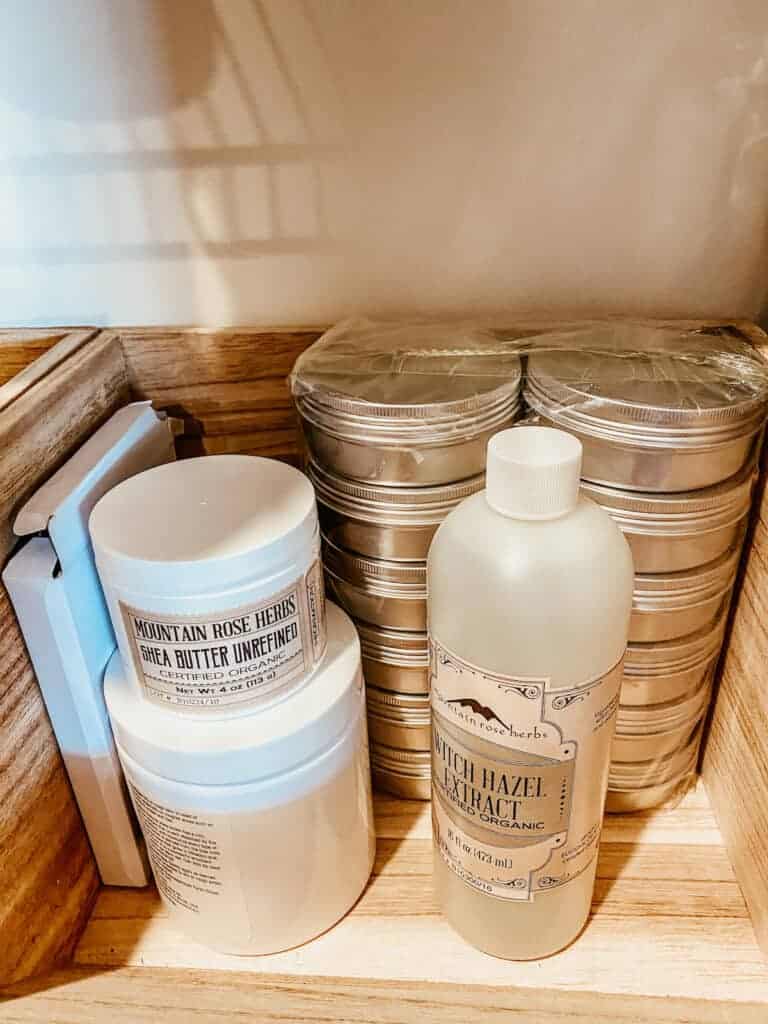
Favorite supplies & equipment
Here is a list of the supplies and equipment that I recommend for creating your home apothecary. They can be sourced from a variety of places and I’ll link to some really great options that I love.
These items can be stored all together in the home apothecary. Or if you’re limited on space, use what works best for you!
I like to try to keep everything together in one location so it’s organized and I don’t have to hunt for it when I need it.
- Mason or other glass jars for storing dried herbs
- Plastic lids for the glass jars
- Dehydrator / drying screens
- Reusable muslin bags
- Mortar & pestle
- Sieve & strainer
- Glass bowl & sauce pan (for double boiler)
- Silicone spatula
- Dark blue or amber bottles
- Dropper bottles
- Funnels
- Tea kettle
- Digital scale
- Herb scissors
- Herb and spice grinder
- Tea kettle
- Label maker
- Recipe cards
- Notebook & pens
- Kitchen twine
- Muslin cloths or cheesecloths (for straining infusions or oils)
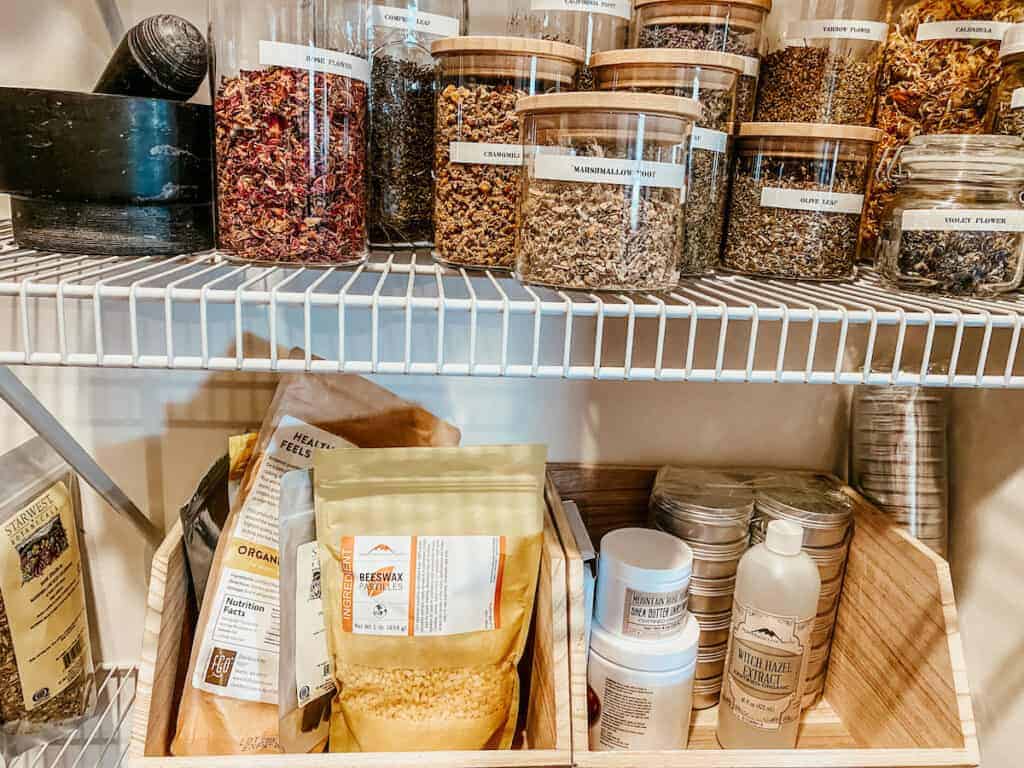
Herbs & other ingredients
Aside from the equipment that I would recommend for setting up the home apothecary, there are some key or favorite items to always keep on hand. Some can serve as both culinary and aid in wellness.
If you have space, growing herbs is a great way to stock your apothecary. If you’re able to grow your own, I would definitely recommend going that route first because of the cost savings.
Many herbs, like rosemary, mint, thyme, calendula, and comfrey, are easy to grow indoors or in a garden. You’ll have control over the growing process, ensuring they are organic and free from pesticides.
Related: Herb Gardening for Beginners
But not all of us have the capabilities to grow all herbal varieties. This is when I source good, clean, and organic herbs. And my favorite place to purchase from is Mountain Rose Herbs.
I’ve been a long time customer from MRH and they have such a wide selection of herbal ingredients and supplies to add to the home apothecary. Browse through their wide selection of bulk dried herbs here.
Here is a list of the herbal ingredients that I recommend for setting up your home apothecary.
- Organic dried herbs
- Beeswax
- Cocoa butter
- Almond oil
- Jojoba oil
- Quality olive oil
- Coconut oil
- or other preferred carrier oils
- Raw honey
- Quality essential oils
- Glycerin
- Good quality alcohol, such as vodka
- Herbal seeds
- Vinegar
- Shea butter
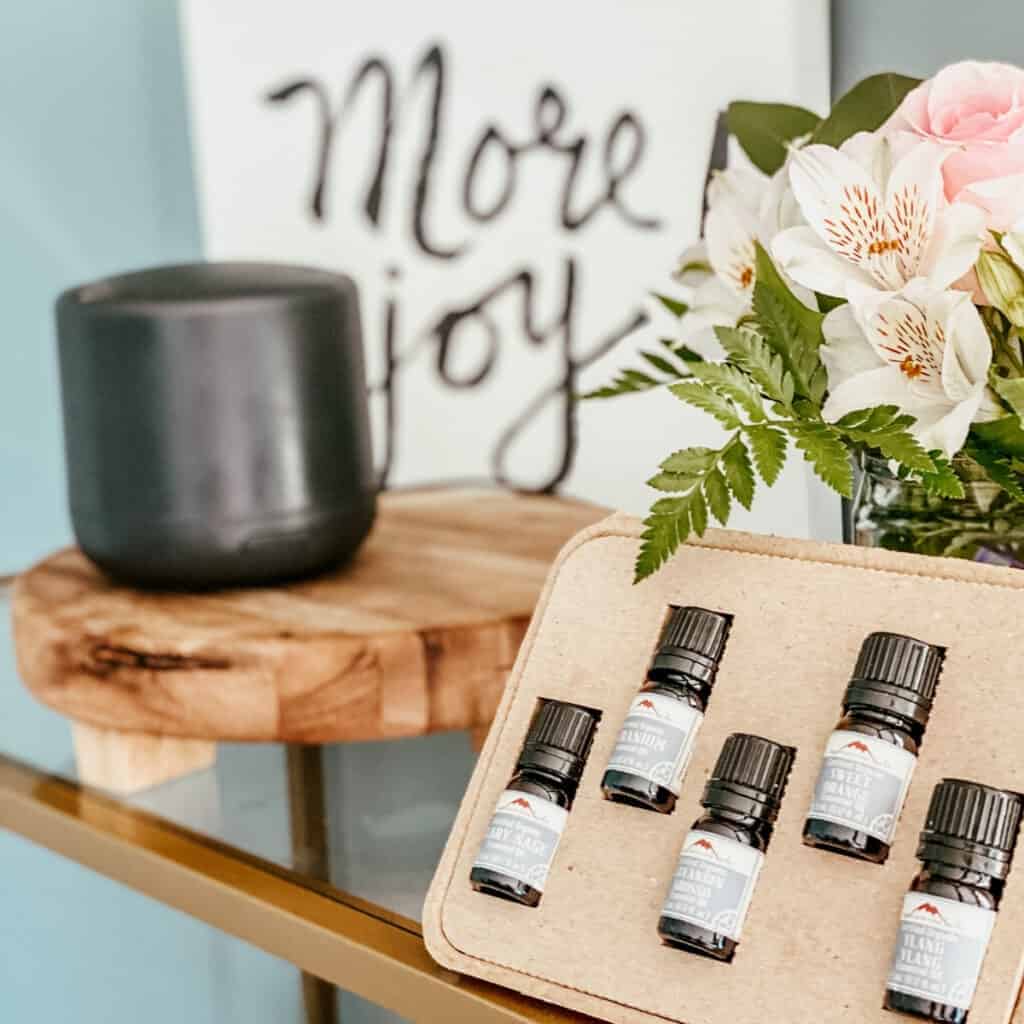
Mountain Rose Herbs also has really great quality of essential oils, blends, and new kits! The new sleep blend smells so good and is one of my new favorites!
Be sure to check out their new essential oil kits! I really love that most of them are certified organic. And they smell amazing too!
As far as which specific herbs and oils to keep on hand, it can vary! It really all depends on what your needs are. I would start with some of the basics like:
- lavender
- chamomile
- mint
- calendula
- comfrey
- plantain
- holy basil
- dandelion root
- clover
- + so much more!
More complex herbs & additional herbs to consider:
- astragalus
- yarrow
- fennel
- marshmallow
- mullein
- horsetail
- vitex berries
- + so much more!
Prepare Herbal Remedies
But it’s also important to remember, everyone has different wellness needs. So be sure to research what you’ll need to stock up on. And also really read up on safety guidelines too.
Start experimenting with different forms of herbal remedies, such as:
- Tinctures: Herbs soaked in alcohol or vinegar to extract active compounds.
- Teas/Infusions: Dried herbs steeped in hot water for internal use.
- Salves and Balms: Ointments made from oils and beeswax for topical use.
- Poultices: Crushed herbs applied directly to the skin for inflammation or injuries.
- Essential Oils: Distilled plant extracts for aromatherapy or topical use (always dilute before applying).
Learn to make your own elderberry syrup or elderberry gummies for cold & flu relief. Or for an immune system support & boost.
Dried herbs typically last 1-2 years, while tinctures and salves can last much longer if stored properly.
Learn how to dehydrate herbs from your garden or local wild harvests to preserve them for future use.
Be aware of shelf lives and refresh your supplies regularly. Labeling is so important for keeping your herbs organized and knowing their freshness.
By taking a mindful approach to creating your apothecary, you’ll have a personalized collection of natural remedies that serve your family’s wellness needs year-round.
FAQ (frequently asked questions)
A home apothecary is a personal collection of natural remedies, herbs, and medicinal preparations used to support health and wellness. It’s essentially a DIY pharmacy filled with ingredients and tools for making herbal medicines and other natural products. The term “apothecary” historically refers to a person who prepared and sold medicines, but in the modern sense, a home apothecary is a space where you can store and craft remedies like herbal teas, tinctures, salves, essential oils, and more.
Education is key! Begin by doing your own research and taking a reputable herbal course. We recommend The Herbal Academy. We also recommend reading some of the books that are recommended in the post.
What are your favorite things to store or ways to set up your home apothecary? Comment below and share with all of us.

